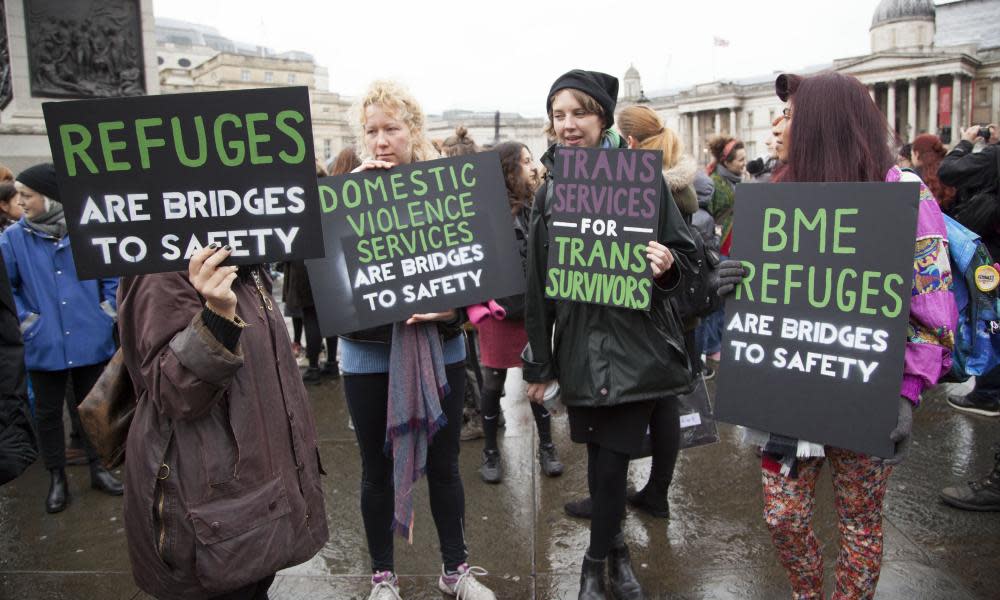Here's the real story of homelessness and domestic abuse that the statistics hide

As an activist with Sisters Uncut, I see every day the reality of homelessness for those who have experienced domestic violence.
The vital role of housing when leaving a violent partner is painfully real to everyone in our organisation – as women who have experienced domestic violence, housing sector workers, homeless people, mothers and chronically underpaid workers. The lack of safe, affordable housing comes up again and again as the single biggest barrier to leaving abusive relationships: how can someone leave when there is nowhere to go?
The Department for Communities and Local Government (DCLG) releases official homelessness statistics based on a test of homelessness and eligibility defined by Part VII of the Housing Act (1996, amended 2002).
At first glance, the latest figures appear to show that the number of people made homeless as a result of domestic violence has fallen by almost 60% in the last decade. But these statistics hide the devastating reality of the number of services for vulnerable women being shut. And they do not tell the story of how many survivors are turned away at the application stage.
In July 2016, a woman approached us because Southwark council had told her it was “reasonable” for her to return, with her three children, to the home of her violent partner. Since then we’ve been campaigning to demand that Southwark council makes homeless survivors a priority. We have recently spoken to survivors in Tower Hamlets who were told they would be offered accommodation with men when Hopetown hostel closes. People who refuse to take this dangerous advice risk being found “intentionally homeless” under homelessness legislation; there is then no further legal duty for a council to help them.
We are fighting the closure of Hopetown. Tower Hamlets council has proposed a 33% cut to women-only beds, alleging that there is less need for them. But when almost half of homeless women have experienced domestic violence and a fifth have experienced childhood abuse, women-only hostels provide a vital safe space in which they can begin to rebuild their lives.
In our experience, the practice of gatekeeping – preventing access to services by turning people away before they can make an application – is rife in council housing departments. And if people are prevented from making homelessness applications, given incorrect information about their entitlement to apply, and told they are not a priority, is it any wonder they don’t show up in DCLG statistics?
Government immigration policy leaves survivors trapped in violent homes
This government can no longer ignore the desperate need for social housing for people experiencing domestic abuse. In May, North London Sisters Uncut reclaimed the Holloway Prison visitors centre to demand that the site be used to build social housing for survivors instead of being sold off for luxury flats. In a queue for social housing with 18,000 other households, survivors in Islington are forced to choose between living with their abuser or homelessness, while the former prison site is sold off to developers.
Cuts to services have been devastating, but they are not the only problem. Many survivors are turned away from housing services because of their access needs, immigration status or gender identity.
There is one specialist refuge for learning disabled survivors in the country, though they’re twice as likely to experience domestic abuse. Women’s Aid found in 2016 that nearly 10% of refuge referrals were declined because the service was unable to meet the support or access needs of the survivor. Health and care needs should never prevent survivors from finding safety.
Migrant survivors assessed as having “no recourse to public funds” are unable to claim housing benefit, and are therefore barred from most refuges and supported housing services. As a result, four out of five BME survivors who approach a refuge are turned away.
Government immigration policy leaves survivors trapped in violent homes. Although up to 80% of trans and gender non-conforming people experience domestic violence, they are often excluded from refuges and forced into street homelessness. Many refuges state that trans women can apply, but this is far from the reality. And with the closure of specialist organisations such as PACE and Broken Rainbow, trans and gender non-conforming people face misinformed, transphobic and dehumanising responses when they seek help to deal with the effects of abuse.
In our experience as activists, survivors and housing and domestic violence sector workers, it’s clear that the DCLG figures are the tip of the iceberg. They are merely further evidence that local authorities are turning their back on survivors, pushing them into increasingly unsafe situations as they cut specialist refuge services and lock off social housing.
Sign up for your free Guardian Housing network newsletter with comment and sector views sent direct to you on the last Friday of the month. Follow us:@GuardianHousing
Looking for a housing job, or need to recruit housing staff? Take a look at Guardian Jobs

 Yahoo News
Yahoo News 
